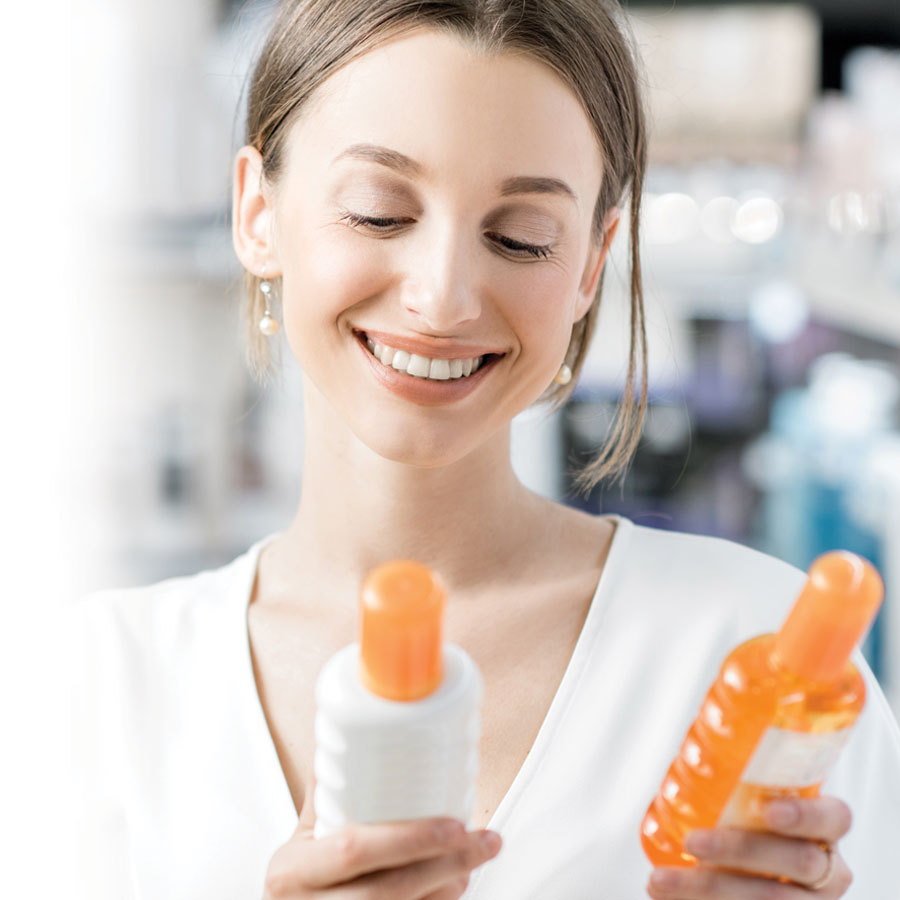Are you looking for the ideal sunscreen for your family? Here is some information on the elements to focus on when choosing a sunscreen.
Choosing a sunscreen
Sunscreens help us fight the harmful effects of the sun's rays. In addition to immediate problems (e.g., sunburn, heat stroke, dehydration), overexposure to the sun can cause long-term damage that promotes premature aging and skin cancer.
Being aware of the risks leads many people to look for the ideal sunscreen, one that will please both adults, who will appreciate its virtues, and children, who will accept to have it spread on their skin without complaining too much! It is easier to use sunscreen properly if you like it and believe in its benefits.
Here are some factors to consider when choosing the best sunscreen.
Ingredients
Sunscreens often contain a lot of ingredients, and it can be difficult to keep track of them. In recent years, some of them have been the subject of controversy due to claims that they may cause:
- skin irritation;
- allergies;
- hormonal fluctuations;
- certain cancers.
So are there really any ingredients to avoid when choosing a sunscreen? It is difficult to draw definite conclusions from the available scientific data, as the latter are often insufficient or contradictory. In addition, claims of harmful effects are often based on small animal studies. To date, there have been very few studies on human subjects.
At this time, the Canadian Dermatology Association (CDA) and Health Canada consider commercial sunscreens to be safe. To learn more about what ingredients to avoid or look for, consult your pharmacist. They can provide you with information based on the latest knowledge and review the list of ingredients with you.
Another interesting consideration is the type of filter used in the sunscreens. There are two main types: chemical filters and physical filters. Chemical or organic filters (e.g., avobenzone, octocrylene, octisalate, etc.) work by absorbing UV rays and converting them into a minute amount of heat. They contribute to the product's pleasing texture and translucent finish on the skin.
The mode of action of physical or mineral sunscreens (e.g., titanium dioxide, zinc oxide, etc.) is to form a protective physical barrier on the surface of the skin to block UV rays through a mirror-like effect. Thus, UV rays do not penetrate the epidermis. This makes even the most sensitive skin more tolerant.
Sun protection factor
The sun protection factor, or SPF, is an index that indicates the degree of sun protection of formulas on the market. More precisely, it is the ratio between the time required for ultraviolet rays to produce a sunburn with and without sunscreen, under controlled laboratory conditions. The higher the SPF, the better the skin is protected.
The CDA recommends that Canadians use sunscreens with an SPF of at least 30. People with reactive or sensitive skin should opt for a higher SPF (40, 45 or 50). An FPS higher than 50 would not really provide any additional benefit.
For more information on the SPF, read the text "What exactly is SPF?"
Broad spectrum sun protection
To be fully effective, sunscreen must protect against ultraviolet A (UVA) and B (UVB) rays - that is, it must be broad-spectrum - since both types of radiation cause skin damage.
Several products on the market provide this protection. Manufacturers can apply for a CDA seal of approval (logo) attesting to this and place it on their product packaging. In addition, the logo in the form of a circle containing the letters "UVA" indicates that a product is approved by Health Canada. The two logos attest that the product protects the skin from UVA rays.
Photostability and water resistance
Some ingredients in sunscreens can lose their effectiveness when exposed to UV light. A sun product is said to be photostable if it retains its protective effects despite exposure to UV rays. This is an important feature.
Ideally, a sunscreen should be water resistant. However, even a water-resistant product must be reapplied if you go swimming or sweat a lot. The initial application should be at least 30 minutes before sun exposure; subsequent applications every two hours and after swimming or heavy perspiration.
Finally, we advise you to choose a product that is:
- unscented;
- non comedogenic;
- hypoallergenic;
- non-greasy;
- with other features that suit you (smell, colour, texture, etc.), because the best product is the one you want to use!
Don’t hesitate to speak to your pharmacist when the time comes to choose a sunscreen or to obtain advice about sun protection.

